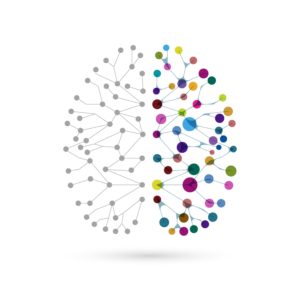Can creativity and art help our brains to be more resistant to damage and degeneration?
Written by Dr. Luis Fornazzari, Consultant on Behavioural Neurology at the Memory Disorder Clinic and the Geriatric Mental Health Outpatient Program at St Michael’s Hospital.
The answer will have profound implications for all of us, from the significance we place upon teaching children to be creative to how we support elders suffering from neurodegenerative diseases like Alzheimer’s and dementia.
In my clinical research, we are close to proving that artists’ neural networks are more resilient.
Through previous clinical studies, my team discovered that the brain anatomy of musicians differed from others. As the musicians developed their skills and talent, they built special neural networks that were much more resistant to the effects of stroke, degeneration, and even traumatic brain injury.
In many cases, musicians afflicted with brain disease could continue to play their instrument and/or compose, even when the disease was affecting other important cerebral functions. They could remember different songs and even learn new ones.
Using a functional MRI, we are currently conducting deeper research into how the brains of musicians may be better equipped to handle brain disorders and diseases in mature and elderly life. We are also researching whether these special “artist” neural networks are helping other networks in the brain to function better and resist the effects of disease.
In short, artists may be less likely to develop degenerative brain diseases – and if they do, they seem to be able to retain more functionality for longer than non-artists. Art has a long-term positive effect on the brain.
This intersection of neural science and art shows promising results and may soon demonstrate art’s protecting and healing power on the human mind.
What Types of Creativity and Art Might Support Brain Resilience?
While we have started our research on musicians, evidence suggests that all types of art and creativity may have similar effects.
For those who aren’t musically inclined, consider these other forms of art:
- Writing
- Painting
- Drawing
- Sculpting
- Dancing
- Acting
- Graphic Designing
It is incredible, for example, how painters can overcome brain injury to continue their craft; many recover from fine motor problems and, despite the limitations, are able to paint nearly as well as before. Meanwhile, non-artists tend to stay impaired for longer, and in some cases are never able to return to their previous activities.
Likewise, we see stories of dancers suffering from Parkinson’s Disease who retain more mobility, experience a delayed progression of the disease, and require less medication for treatment than non-dancers.
This is a new area of research, but the initial studies have been encouraging. We have also published several case studies about different types of artists, which strongly suggest artists are processing their art through different neural networks that are more resistant to the pathological effects of brain disorders.
In the future, we plan to expand our research to these other types of artists with the hopes of proving that art, in any of it’s manifestations, has the power of resilience.
How Can You Use this Research in Your Life?
 No matter your age, spending more time on your creative passions is a smart investment in your brain health.
No matter your age, spending more time on your creative passions is a smart investment in your brain health.
It’s especially important to encourage our elderly loved ones to pursue their artistic inclinations. Based on this research, art could help delay the onset and combat the effects of diseases like Alzheimer’s and dementia. Keeping the mind intellectually engaged in old age is critical for building strong neural networks and stimulating brain function.
Plus, the enjoyment and fulfillment we find in our artistic pursuits cannot be underestimated in improving quality of life – for children, adults, and seniors alike!
About Dr. Luis Fornazzari
Luis Fornazzari MD FRCPC, is a Behavioral Neurologist (Neuropsychiatry), a graduate of the University of Chile, and post postgraduate from the Universities of British Columbia and the University of Toronto. He is a Consultant on Behavioral Neurology at the Memory Disorder Clinic, and the Geriatric Mental Health Outpatient Program at St Michael’s Hospital. He is a member of the Division of Neurology, the Department of Psychiatry, and the Faculty of Music at the University of Toronto.
His clinical work is dedicated to neurodegenerative diseases affecting the central nervous system, particularly dementia. Over the last twenty years, he has been studying artists from a neurological point of view, the way they create their work, and how the artists’ neural networks are preserved in diseases of the brain.
His work has been published in Neurological Journals in Canada, USA, Mexico, Europe, and Latin America. He frequently presents his work on these three continents.
Silver Sherpa offers a unique combination of healthcare expertise, estate planning knowledge, and project management skills to help the elderly and families.
Contact us to discuss your situation – it can be as brief as 15 minutes or as long as you need.
You may also be interested in:
